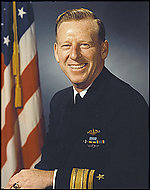July 03, 2007
Gratuitous U.S. Navy Geekery Posting

R.I.P. Rear Admiral Eugene B. Fluckey, recipient of the Medal of Honor and four Navy Crosses, whose career as a sub commander operating off the coast of China in WWII reads like a modern day Jack Aubrey novel:
On Jan. 25, 1945, Adm. Fluckey embarked on what Navy officials, seldom given to hyperbole, called "virtually a suicide mission -- a naval epic." In "an exceptional feat of brilliant deduction and bold tracking," in the words of his Medal of Honor citation, Adm. Fluckey found more than 30 Japanese vessels lurking in a concealed harbor protected by mines and rocky shoals.Evading a cordon of armed escort boats, the Barb slipped into the harbor on a moonless, cloudy night and scored eight direct torpedo hits on six large ships. One of them was an ammunition vessel, which exploded and caused "inestimable damage by the resultant flying shells and other pyrotechnics," according to the Medal of Honor citation.
As Adm. Fluckey watched from the bridge of his submarine, The Washington Post reported in 1945, "Japanese ships were erupting in the night like a nest of volcanoes."
The Barb then fled at high speed "through uncharted rocky waters thick with fishing junks," pursued by two Japanese gunboats. Because of the shallow water, the submarine had to stay on the surface, dodging obstacles and steady fire for a full hour before reaching the safe depths of the open sea.
"The significance of that mission," said retired Navy Capt. Max Duncan, who was the chief gunnery and torpedo officer of the Barb, "was that we completely disrupted the entire shipping system the Japanese had developed at that point in the war."
On other occasions, Adm. Fluckey maneuvered his submarine so close to shore that he could bombard coastal installations with torpedoes and guns. On its final patrol in 1945, the Barb became the first U.S. submarine equipped with ballistic missiles.
One time, Adm. Fluckey selected eight commandos from his crew to paddle ashore in rubber boats and place a 55-pound bomb under railroad ties on the northern Japanese island then called Karafuto. As the men were rowing back to the Barb in darkness, the pressure-sensitive charge blew up a 16-car troop train. It was the only time in World War II that U.S. forces set foot on the soil of the Japanese home islands.
Adm. Fluckey and his 80-man crew were credited with sinking 29 ships, including an aircraft carrier, destroyer and cruiser. He destroyed more gross tonnage than any other submarine commander. For his wartime exploits, he became known as "Lucky Fluckey" and the "Galloping Ghost of the China Coast."
Read the rest. Pretty damned amazing.
Yips! to INDCent Bill.
When he showed up, the Japanese were Flucked.
Posted by: Boy Named Sous at July 3, 2007 07:45 PM

 Image courtesy of the lovely and talented
Image courtesy of the lovely and talented 